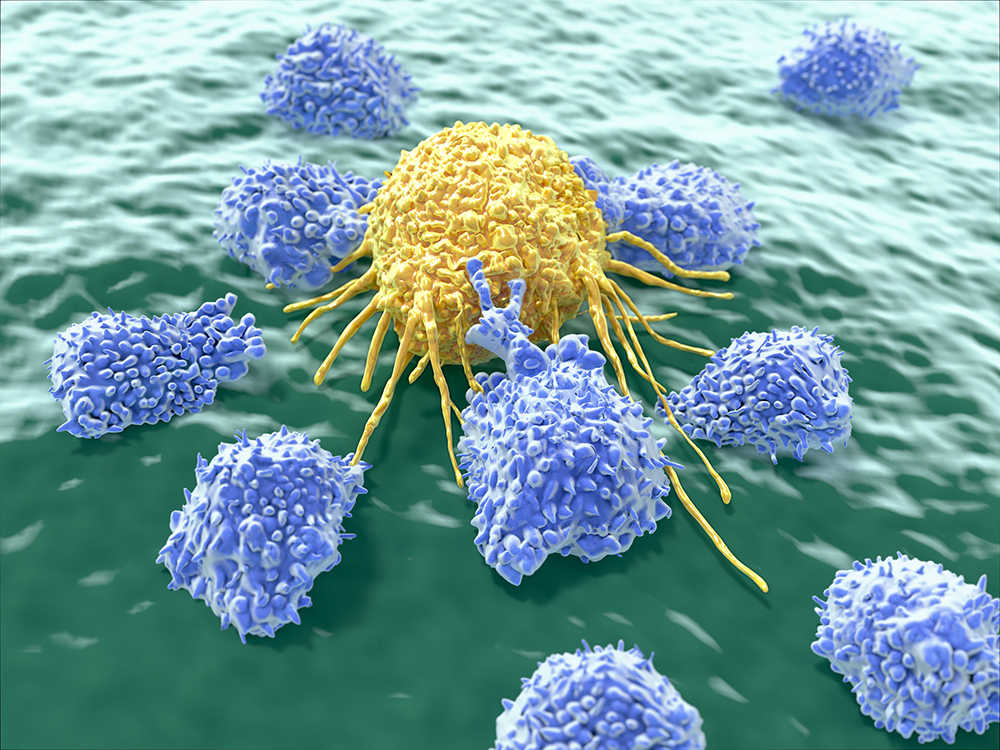
Could freezing enhanced natural killer cells lead to an effective allogeneic, or “off-the-shelf”, cancer cell and gene therapy for pancreatic cancer?
City of Hope National Medical Center researchers believe they may have made a breakthrough. Their development of chimeric antigen receptor (CAR) natural killer (NK) cells worked in treating mice with pancreatic cancer.
City of Hope is one of the top cancer facilities in the world and is advancing important cell therapy research led by Christine Brown, PhD, a member of Alliance for Cancer Gene Therapy’s Scientific Advisory Council.
CAR NK-cell therapy in the works at City of Hope
City of Hope is working with CytoImmune Therapeutics to develop the prostate stem cell antigen (PSCA) CAR NK-cell therapy. PSCA is presented on pancreatic cancer tumors, so PSCA-targeted CAR therapies are a way to help immune cells find pancreatic cancer cells.
This novel therapy is formally called PSCA CAR_s15 NK cells, or CYTO NK-203. Making this science unique is that these CAR NK cells could be easier to provide to patients.
Explaining NK-cell therapy for cancer
CAR NK-cell therapy is similar to CAR T-cell therapy. CAR T-cell therapy is a cell and gene therapy where scientists add a gene to T cells. The gene, called a chimeric antigen receptor, helps T cells locate and attack cancer cells.
The U.S. Food and Drug Administration approved six CAR T-cell therapies for certain blood cancers during the last few years. None are approved for solid tumors like pancreatic cancer, but research is underway.
Pancreatic cancer has a five-year survival rate of 11% according to the latest data from American Cancer Society. It’s the third-leading cause of cancer-related deaths in the United States. Work must be done to improve therapeutic options for patients with this disease.
How to make allogeneic cancer cell and gene therapies
CAR NK cells are allogeneic, meaning the cells are taken from a non-related healthy donor rather than the patient themselves. Allogeneic, or “off-the-shelf” therapies, involve mass production of a therapy from healthy donor cells that could be used widely for many patients.
This strategy could potentially make treatment more accessible – cheaper and quicker – since individual patients don’t need to have their immune cells removed and reprogrammed in a laboratory, a process taking 2-5 weeks.
City of Hope researchers created the CYTO NK-203 therapy and froze the cells. They thawed them prior to use in mice models. The CAR NK cells were also engineered to emit IL-15 to preserve the energy of immune cells.
The enhanced NK cells persisted for more than 90 days following the final infusion. The mice survived longer than they usually do with pancreatic cancer. The results from this early research may lead to a human patient trial starting in 2022.
UCLA attempting similar challenge with cell therapy
University of California Los Angeles researchers are attempting the same feat: to make allogeneic cell and gene therapy for cancer. They’re attempting to develop and freeze stem-cell supplying invariant natural killer T (iNKT) cells.
Lily Yang, a scientist at UCLA’s cancer center, said one person’s blood donation could provide 300,000 doses of iNKT therapy. The research at UCLA was tested on mice with myeloma, a blood cancer proven to benefit from CAR T-cell therapy.
Alliance for Cancer Gene Therapy has previously supported research at UCLA. Yvonne Chen, MD, received an Alliance-funded grant in 2015 to create a more efficient process of creating effective CAR T cells. The university’s Jonsson Comprehensive Cancer Center is a recognized leader in testing and advancing new therapies, such as iNKT cells.
“At this yield, the cost of producing immune cell products could be dramatically reduced.” — Lily Yang, a scientist at UCLA’s cancer center
Alliance for Cancer Gene Therapy promotes new approaches
Alliance for Cancer Gene Therapy is committed to developing new cancer cell and gene therapies. The Alliance was on the ground floor of funding the development of CAR T-cell therapies for blood cancers, and we collaborate with top doctors from the leading cancer hospitals in the world, including those involved in creating cell and gene therapies.
We will continue to monitor the therapies showing the most promise so we can determine the best uses for our funding. To help us find cures for cancer, please donate to Alliance for Cancer Gene Therapy and bring more life-saving science into clinical trials for patients.
Page sources
- Off-the-shelf PSCA-directed chimeric antigen receptor natural killer cell therapy to treat pancreatic cancer. Gastroenterology. Retrieved from: https://www.gastrojournal.org/article/S0016-5085%2822%2900001-4/fulltext. Accessed: 01/21/2022.
- UCLA scientists make strides toward an ‘off-the-shelf’ immune cell therapy for cancer. UCLA. Retrieved from: https://newsroom.ucla.edu/releases/off-the-shelf-immune-cell-therapy-for-cancer. Accessed: 01/21/2022.
- City of Hope and CytoImmune announce study demonstrating novel off-the-shelf chimeric antigen receptor (CAR) natural killer (NK) cell-based therapy against pancreatic cancer. BusinessWire. Retrieved from: https://www.businesswire.com/news/home/20220118005366/en/City-of-Hope-and-CytoImmune-announce-study-demonstrating-novel-off-the-shelf-chimeric-antigen-receptor-CAR-natural-killer-NK-cell-based-therapy-against-pancreatic-cancer. Accessed: 01/22/2022.



